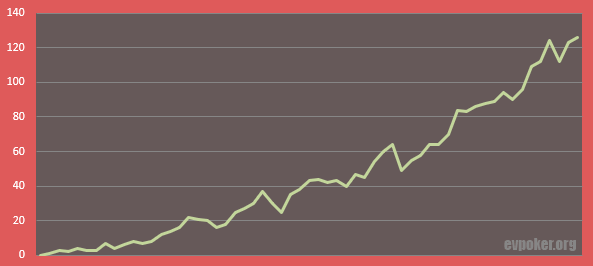The prospects of winning
In poker, 1 in 20 wins, the rest loses. That is an acknowledged fact, even that the numbers may not be exact. So, looking on these numbers, for what reason should you considering it a good idea to play if winning money is a part of the reason for it?
Nobody is always a winner, and anybody who says he is, is either a liar or doesn't play poker. Amarillo Slim
The misunderstanding about the 5%
Obviously, you won't win in poker if you aren’t among the better player. You must be one of the top 5% players, right? Not, necessary. Remember that all players don’t play on the same limits.
If you play tournaments with $5 buy-ins, you don’t need the same skill as you would need in $50 buy-in tournaments. In other words, there a many layer of the 5% and you only need to be among the better players in your own neighborhood, or more precisely, on your own buy-in level.
Conclusion: if you play with low stakes in poker, you have better prospects to win more than you lose than if you play with higher stakes.
The flexible situation
In poker, you don’t play against the casino but against other people. That means that the probabilities of winning are unfixed and depending on the situation. You can never assume that you have a certain winning probability, neither that you have a "lock" or "cinch" as a sportsbettor would put it; you can on the other hand, by observe the opponents, presume that you have an advantage.
Around 10% win money in tournaments (per tournament)
In poker tournament the prizes are distributed to around 10% of the players. Since only one of ten wins are not especially good in itself, but the money curve increase as you get closer to the first prize.

An example of how a prize pool can be shared between 100 players.
As illustrated in the diagram, the big value in tournaments is in the top positions. If 100 players participates in a $1 buy-in tournament, it will be $100 in the prize pool. Around 10% will share this money and the winner may take home 10% of the whole prize pool.
So, to be a winning tournament player, your goal is not to “get in the money”, it is to play for the top positions. This may seem obvious, but many players use strategies to get in the money, they don’t like to take to many risks. But it is no disaster to be eliminated from a tournament, the disaster is if a player never gets to a top position.
Conclusion: a conservative playing style is not very well suited for tournament play due to the asymmetrical prize distribution. Things can be different in Sit n Go’s there the prize distribution is often symmetrical. In these cases, you may have much to win just to take it easy and watch when other players eliminate each other.
Cash game and grinding
In cash game, you will never get any big prizes, instead you try to accumulate small figures all the time – some call it grinding.

An example of how a winning grinder will accumulate income over time in cash game.
The earnings and losses in cash game is less volatile compared to tournaments. It’s at the same time less emotionally demanding, since you don’t either win or being eliminated as in tournaments, and more emotionally demanding since you may have much patience and be satisfied with less winning per session.
The luck factors
The luck will always be a factor. Some players get a big break by winning a big tournament. Whoese are often skilled (but far from always), but they hadn’t won without some luck.
As they say, the luck becomes even in the long perspective. But sometimes, the long perspective is very long and if you don’t play ten thousands of hands, your winning prospect will also depend on your luck.
Related articles:
